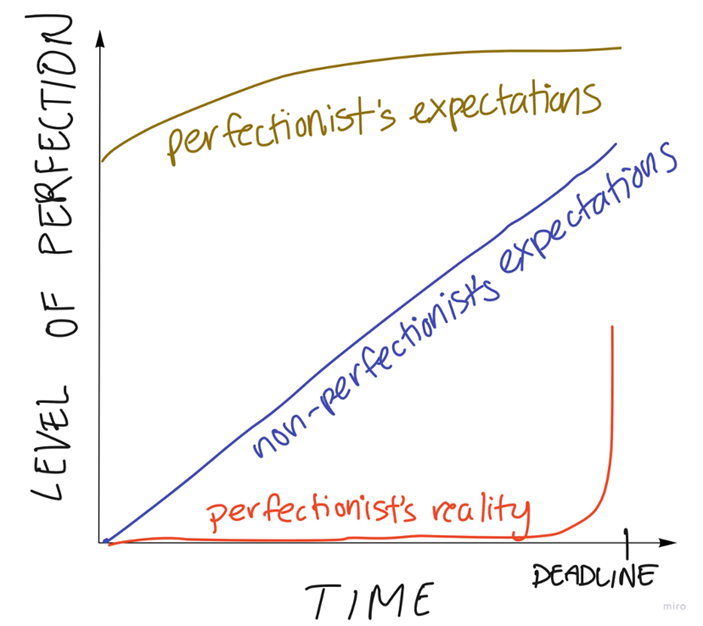Being an entrepreneur comes with its fair share of challenges, including learning how to manage your time and energy when no one is managing you. Procrastination can stall your progress and stunt the growth of your business. In this blog post, we’ll explore the common reasons why entrepreneurs’ productivity can suffer, then provide practical strategies to boost your productivity so you can increase your income and impact.
Table of Contents
1. Managing Fears and Self-Doubt
When you’re running your own business, fears and self-doubt can surface more frequently than in traditional work settings. The uncertainty and responsibility that come with managing business finances for the first time, hiring a team that depends on you, or learning a software for the first time can add a lot of stress. Fear grows when left unmanaged. It’s crucial to address your fears head-on and build confidence in your abilities.
Without managing your mind and keeping fears in check, you’ll find yourself knowing exactly what you need to do, but just not doing it. You can have the most brilliant ideas, massive creativity, and the strategy to back it up, and still not go anywhere if your mind gets in the way. Anytime you are wondering if you’re good enough, smart enough, or stressing about the worst-case scenario, you are less likely to take action.
If you’re not sure how to manage your fears, your next step is to grab a copy of my Fear Exposing Worksheet. This will help you articulate what’s been holding you back and provide you with strategies to manage it, so you take more confident action.
2. Managing Multiple Roles and Balancing Priorities
As an entrepreneur, you wear many hats and juggle numerous responsibilities. With so much on your plate, it’s easy to get caught up in lower-priority tasks and lose sight of what truly matters. Productivity is not about being busy; it’s about being effective. Falling into the trap of productive procrastination, where you use less important work as a means of avoiding essential tasks, can stunt your progress. Prioritize your tasks and focus on high-impact activities. Limit your to-do list to 3-5 items that will move the needle forward, otherwise, you’ll often reach for the easiest tasks and kick the more difficult but important ones down the curb. Avoid getting caught in the cycle of busyness without progress.
To shift from reactive to proactive, hold monthly and quarterly planning meetings, whether you are a team of one or a team of many. Map out important initiatives and avoid getting sidetracked by tasks that are not aligned with your goals. Many entrepreneurs struggle with shiny object syndrome. They find themselves jumping to new initiatives without seeing current projects through the finish line, and endlessly tweaking, rather than doubling down on what is working. By keeping this in check, you’ll stop breaking things that don’t need to be broken, and start doing more of what you keep saying you need to do.
3. Effective Delegation
If you’re not delegating items that you could benefit from getting off your plate, your productivity will suffer. If you’re overwhelmed and exhausted because you’re working way too many hours, it is likely because you fall into one of these three categories:
- You have limited finances to spare for hiring help
- You have the finances but are resisting the process of finding, onboarding, and training help
- You have the help, but you’re resisting releasing control
In the early stages, this might not make sense if you have limited finances to spare. But once you’ve got a bit of an income buffer, if you could hire someone to just take 5 hours per month off your plate, which frees you up to spend those hours on higher earning activities, it’s worth exploring.
If you’re resisting hiring help, because you’re dreading the process and keep telling yourself “Why bother if I can do it all?” I would recognize your income will continue to stagnate if you continue as the bottleneck of your growth. The cost of fifteen hours to find and train help can save you hundreds of hours in the long run.
If you have the help, but recognize you’re still letting way too much travel you, you either have a team you don’t fully trust to do a good job, or releasing control provokes too much anxiety. Hiring a good team, learning how to effectively delegate tasks, and gradually building trust in your team members to take on responsibilities will be the best thing that’s ever happened to your time, energy, and income. Shift your strategy so your business is less reliant on you, without affecting your services. Processing the fears behind releasing control, will help you feel more comfortable with delegation. I teach you how to do that in my fear management worksheet:
4. Holding Yourself Accountable
5. Embracing Messy Action
If you find yourself endlessly tweaking projects and emails, and overthinking decisions instead of moving forward, you need to fire perfectionism from your life. The quality of your work can stay, but the pressure, people-pleasing, and endless indecisiveness must go in order to see real growth. Understand that creativity does not thrive under pressure, so the best thing you can do is allow messy first drafts for new projects, responses, and directions that you take. Instead of getting stuck in endless indecisiveness, take action and make adjustments along the way.
Remember the phrase “Done is better than perfect.” If you place too much pressure on getting things perfect right out the door, you are going to experience more resistance to taking action. You will consequently rely on deadlines, where the fear of disappointing others and embarrassing yourself suddenly overrides the fear of not doing good enough. There is no shame in using deadlines to motivate yourself, but when you solely rely on them, you’ll find there is a lot of continuous stress in your life. We don’t want that.
Embrace a non-perfectionist’s approach by lowering initial expectations, so that you can just get started (be the blue line), just like I embraced making a messy graph below for this demonstration.

Overcoming procrastination and increasing productivity is essential for entrepreneurs who want to grow their businesses and achieve their goals. By addressing the challenges specific to entrepreneurship, such as fears, multiple roles, and self-accountability, you can start to feel like you’re no longer leaving potential on the table. Remember to delegate, prioritize strategically, and embrace imperfection as you take action toward your business’s growth.
